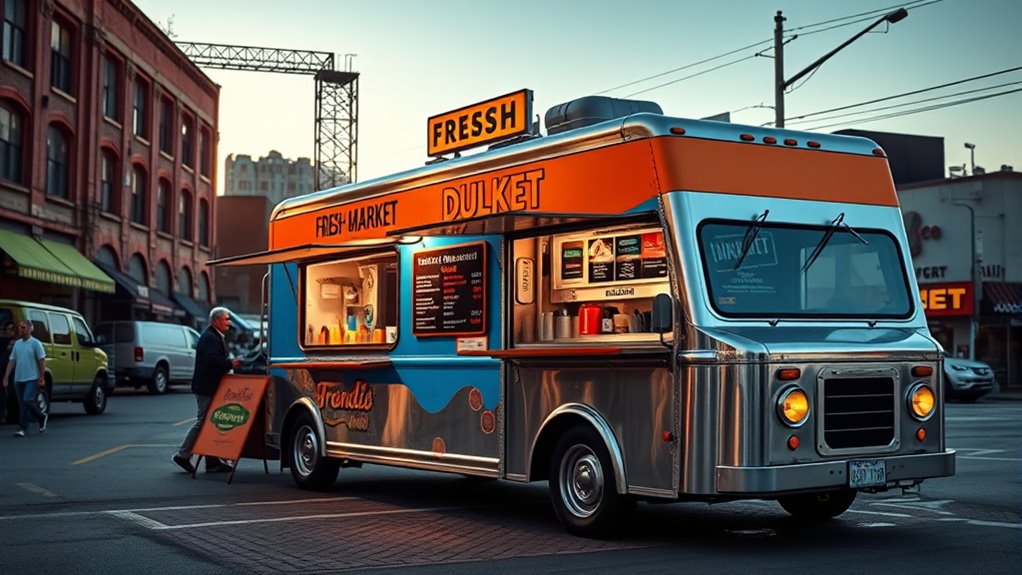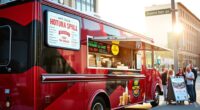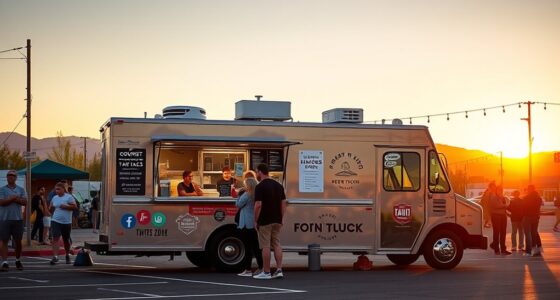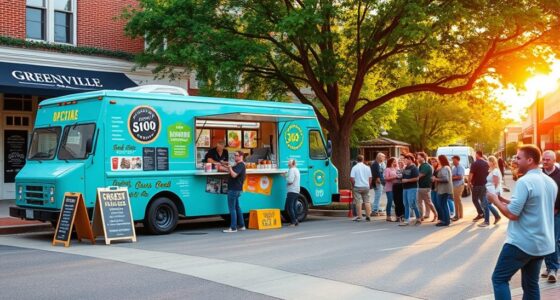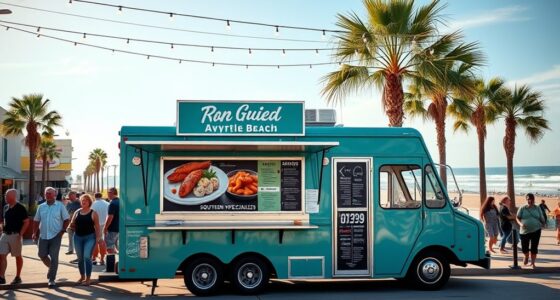To open a food truck in Duluth, you’ll need to secure permits from the City Clerk’s Office, meet safety and health standards, and carry liability insurance. Costs include truck setup, permits, and daily expenses like fuel, wages, and supplies. Choose approved locations like parks and festivals, and guarantee compliance with parking rules. Develop a menu that meets food safety regulations and promote through social media and local events. Following these steps helps set a solid foundation for your food truck business—you’ll find more details below.
Key Takeaways
- Obtain necessary permits from Duluth City Clerk’s Office, including vehicle safety, health licenses, and food handler certifications.
- Budget for initial truck costs ($46,700–$187,440), equipment, permits, insurance, and ongoing expenses like fuel and wages.
- Use approved Duluth locations such as parks and festivals, ensuring compliance with parking restrictions and event permits.
- Develop a compliant menu with proper food safety practices, detailed documentation, and approval for high-risk foods.
- Promote your food truck through social media, community events, and targeted advertising while maintaining strict food safety standards.
Navigating Permits and Licensing in Duluth
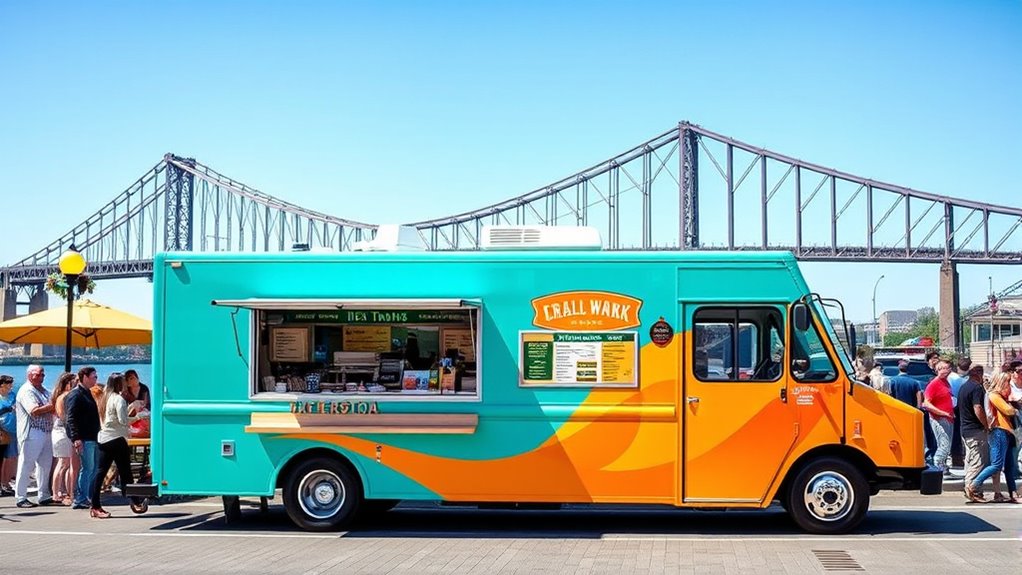
Are you ready to start your food truck journey in Duluth? First, you’ll need to obtain the proper city license, which varies for non-motorized carts and motorized vehicles, through the Duluth City Clerk’s Office. Be prepared to submit an application along with proof of your Minnesota Department of Health license if required. You’ll also need to carry at least $100,000 in liability insurance, naming Duluth as an additional insured. Before approval, the Police and Fire Departments will inspect your vehicle for safety and compliance. Additionally, you must secure a Food Handler License from the Minnesota Department of Agriculture, which involves submitting an application, paying a fee, and passing inspections. Ensuring you meet all these requirements is essential to legally operate your food truck in Duluth. All mobile food units must also comply with Licensing Modernization regulations, including food safety standards and plan submissions, to ensure legal operation. Moreover, staying updated on hydrocolloid standards can help maintain compliance with emerging safety protocols in food service.
Understanding Costs and Fees for Food Truck Operations
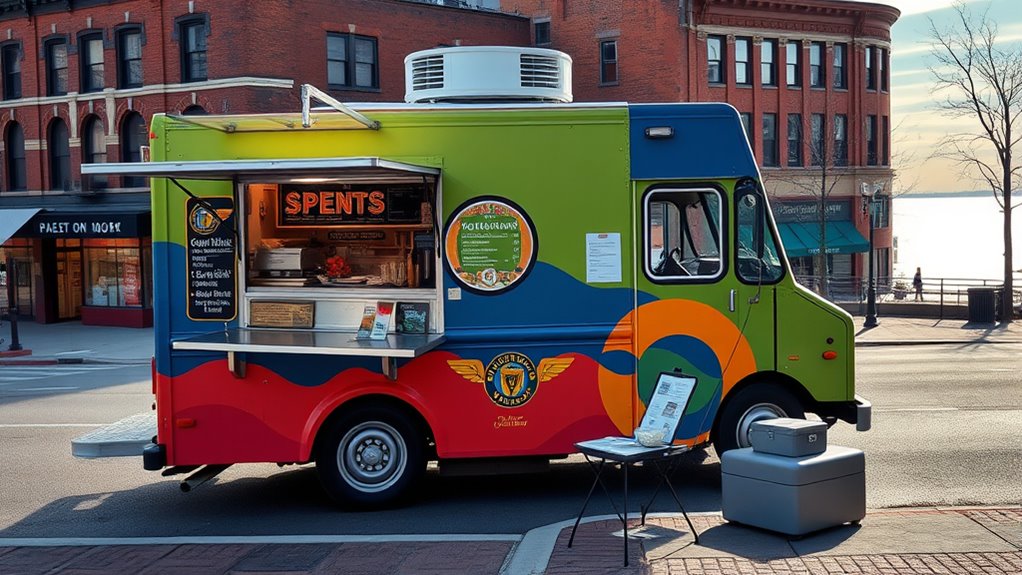
Starting your food truck business in Duluth involves understanding the costs involved to keep your operations profitable. Initial truck costs range from about $46,700 to $187,440, depending on vehicle condition and setup. You may need extra investment for custom kitchen equipment or inventory, which typically costs $1,000 to $2,000 upfront. Don’t forget permits, licenses, insurance, and a point-of-sale system—they come with separate fees. Monthly expenses include fuel and propane, averaging $300 to $1,000, plus maintenance at $500 to $1,000. Labor wages for staff can be $6,000 to $12,000 monthly, while inventory fluctuates from $1,000 to $5,000. Permit fees, like Duluth’s annual $200 Commercial Use/Occupancy Permit, and insurance costs, also factor into your ongoing expenses. Proper budgeting and financial planning are essential to sustain and grow your food truck business in Duluth. Additionally, understanding projector technology and how it impacts image quality can be useful if you’re considering multimedia displays or entertainment elements in your food truck setup.
Selecting Approved Locations and Parking Restrictions
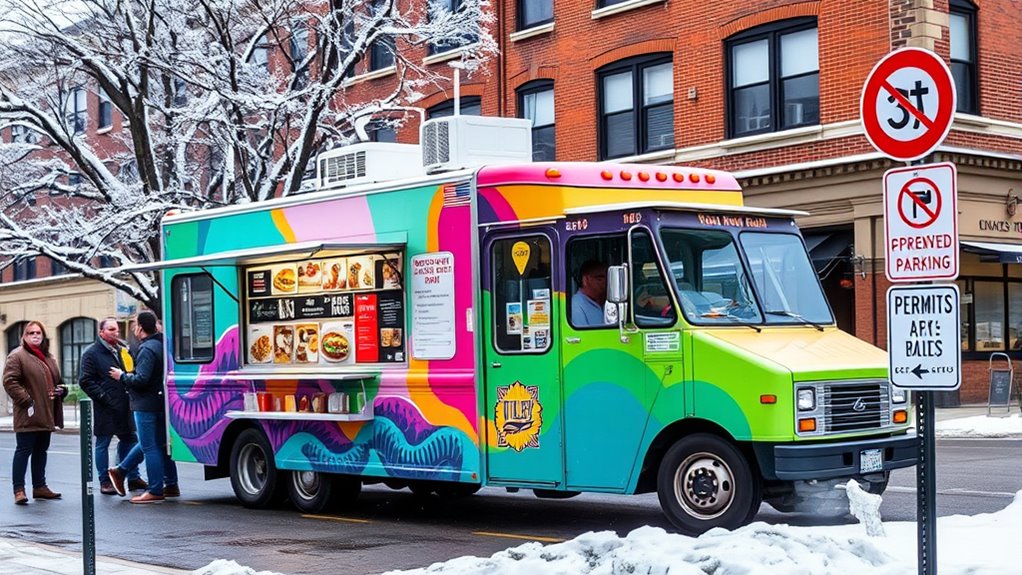
To operate your food truck legally and successfully in Duluth, you need to select approved locations and understand parking restrictions. Duluth’s parks offer specific sites where vending is permitted, such as Chambers Grove, Lincoln Park, and Bayfront Festival Park. You must also avoid blocking roads, trailheads, or parking lots, especially during events. Duluth’s city regulations require that you obtain permits for approved locations and coordinate with event organizers for permission during special events. Ensure you follow these guidelines: 1. Obtain permits for approved locations and coordinate with event organizers for permission during special events. 2. Avoid parking in designated concession areas when city or partner-operated concessions are open. 3. Respect restrictions at spots like Wheeler Athletic Complex and Fairmont Park, especially during active events. 4. Communicate with city officials to confirm allowable dates, times, and restrictions to prevent conflicts and guarantee compliance. Additionally, understanding local regulations and enforcement policies can help you avoid fines or disruptions.
Complying With Menu and Food Preparation Regulations
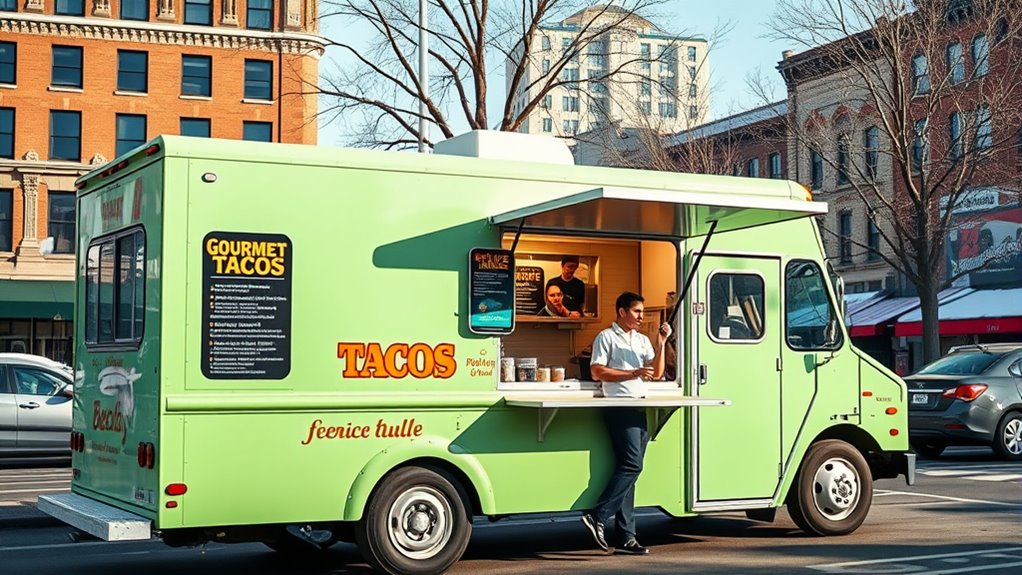
To keep your food truck compliant, you need to follow Minnesota’s strict food safety standards for menu approval, storage, and preparation. This means submitting detailed plans, meeting temperature controls, and ensuring proper handling to prevent contamination. Staying on top of these regulations helps protect your customers and keeps your operation running smoothly. Updated licensing rules and food safety requirements introduced in 2025 also emphasize the importance of adherence to these standards to avoid penalties and ensure your business remains in good standing.
Menu Approval Process
Ensuring your menu complies with Minnesota Food Code regulations is essential for obtaining and maintaining your food truck license in Duluth. The approval process involves several steps:
- Present your menu items and preparation methods during licensing or inspections to verify they meet health department standards. Proper documentation supports compliance and facilitates inspections.
- Verify that all food labels and descriptions accurately reflect ingredients and preparation techniques, in line with Minnesota labeling regulations.
- Obtain approval for high-risk foods, which may need additional permits or scrutiny based on safety assessments by health inspectors.
- Keep detailed documentation of ingredients, sourcing, and preparation methods available at your truck, facilitating compliance checks and quick responses to regulatory inquiries. Food safety protocols are critical components of the approval process to prevent contamination and ensure consumer health.
Food Safety Standards
Adhering to food safety standards is essential when operating a food truck in Duluth, especially regarding menu and food preparation regulations. You must obtain a Food Handler License, which involves submitting an application, paying a fee, and passing inspections to guarantee compliance with Minnesota Food Code standards. Your truck’s equipment and surfaces must be commercial grade and sanitary, with proper temperature controls for perishable foods. Handwashing stations and sanitizers need to be accessible at all times. You must also prevent cross-contamination by using separate tools and surfaces for raw and cooked foods. Additionally, you’ll need to submit detailed plans and specifications for your truck’s layout and equipment before starting operations. Regular inspections by local authorities ensure ongoing adherence to these strict safety requirements. Emphasizing food safety practices not only protects public health but also supports the cultural impact of maintaining trustworthy culinary standards.
Storage and Preparation
Compliance with state and local licensing requirements is essential for proper storage and food preparation in your Duluth food truck. You must submit detailed plans outlining your menu, storage, and preparation methods for regulatory review. Verify your equipment and storage areas meet Minnesota Food Code standards, particularly regarding temperature control and separation of raw and ready-to-eat foods. Proper planning includes:
- Using approved, easily cleanable surfaces and durable materials in all food prep areas.
- Providing refrigeration and hot-holding units that meet NSF standards to maintain safe food temperatures.
- Incorporating waste containers to prevent contamination and meet litter regulations.
- Ensuring proper disposal of wastewater with holding tanks and off-site disposal methods.
- Regularly monitoring and recording temperature logs to ensure ongoing compliance with food safety standards. Proper temperature control
Supporting documentation may be required during inspections to verify compliance and proper setup.
Staying compliant guarantees your operations run smoothly while safeguarding food safety and adhering to health regulations.
Developing Effective Marketing Strategies for Your Food Truck
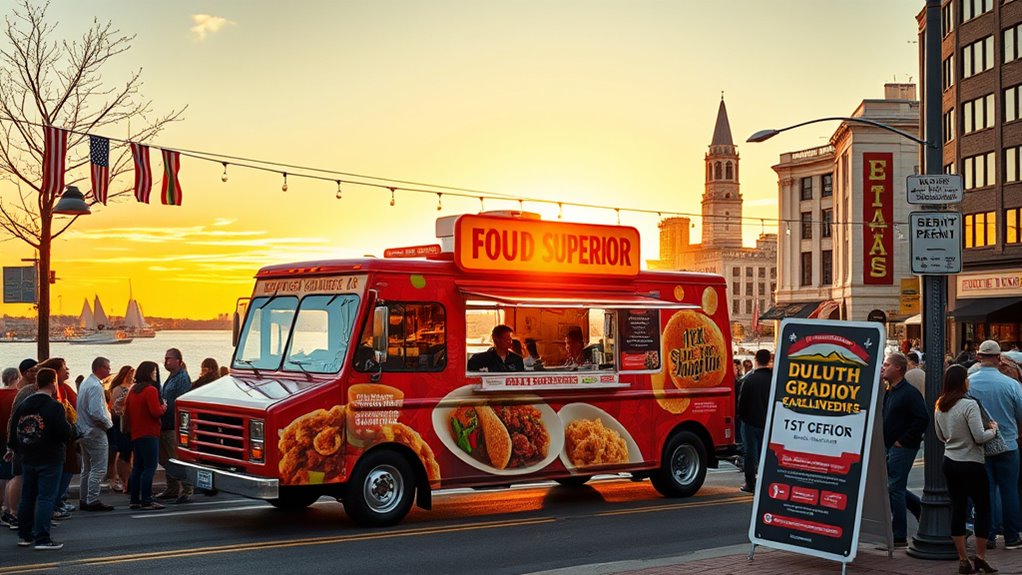
Developing effective marketing strategies for your food truck requires a multi-faceted approach that leverages both digital tools and community engagement. Use social media platforms like Facebook, which 75% of food trucks rely on, to regularly promote your offerings and engage with customers. Incorporate mobile location apps, which have seen a 35% increase in downloads, to boost your discoverability. Participate in local events and festivals—80% of food trucks attend at least three annually—to build brand recognition and foster loyalty. Implement loyalty and email marketing programs to increase repeat visits; over half of food trucks see a 30% growth through these efforts. Additionally, utilize data analytics and GPS services to target customers effectively and refine your marketing strategies for greater ROI. Utilizing targeted advertising can lead to a 20% increase in customer engagement, further enhancing your overall marketing effectiveness. To optimize your outreach, consider implementing customer feedback mechanisms to better understand and meet your audience’s preferences.
Best Practices for Maintaining Compliance and Operational Success
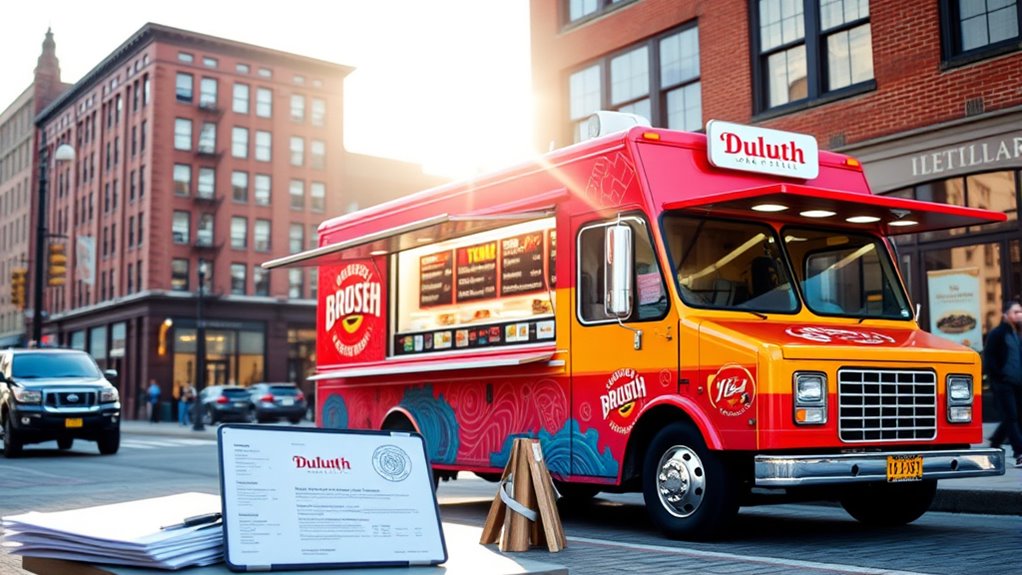
Running a successful food truck in Duluth means not only attracting customers but also staying within legal and safety boundaries. To do this, follow these best practices:
- Obtain all necessary licenses, including a city license, Food Handler License, and appropriate insurance, ensuring coverage meets minimum requirements.
- Conduct regular inspections and adhere to Minnesota Food Code, focusing on safe food storage, handling, and preparation.
- Park only in designated areas, maintaining proper distances from restaurants and permitted events, and respect parking time limits.
- Prepare detailed plans before constructing your unit, including layout and equipment descriptions, and keep records of inspections and compliance documentation.
- Be aware of emotional support strategies for dealing with stress or conflicts that may arise during your operations, ensuring a positive environment for both staff and customers.
Staying compliant helps prevent fines, operational disruptions, and safety issues, ensuring your food truck thrives in Duluth.
Frequently Asked Questions
How Long Does the Permit Approval Process Typically Take in Duluth?
You’re probably wondering how long the permit approval takes in Duluth. Typically, it takes about 2 to 4 weeks once you submit a complete application, pass all inspections, and provide necessary documentation like insurance. To avoid delays, schedule your inspections at least 14 days before your planned opening. Keep in mind, any incomplete paperwork or delays in inspections can extend this timeline, so staying organized helps speed up the process.
Are There Any Specific Noise Restrictions for Food Trucks in City Parks?
You wonder if there are specific noise restrictions for food trucks in Duluth parks. Currently, Duluth’s noise regulations focus on general city and residential limits, especially during night hours. While parks have rules about noise, no particular standards target food trucks directly. Enforcement relies on city noise ordinances and patrols, which can address noise complaints. To avoid issues, consider operating quieter generators and being mindful of noise levels during park hours.
Can I Operate a Food Truck During City-Sponsored Events Without Additional Permits?
You can’t operate a food truck during city-sponsored events without obtaining additional permits. While a valid city license is necessary, event organizers often require separate approvals or permits to vend at their specific events. You need to coordinate with event promoters beforehand, follow their rules, and secure any special permissions. Also, make certain you’re complying with all local regulations, including distances from event sites and trash management, to operate legally and successfully during these events.
What Are the Penalties for Parking Violations or Operating Outside Approved Hours?
Parking violations in Duluth hit like a slap to the face. If you park illegally, you’ll get warnings first, but repeat offenses bring fines up to $24 or more, especially for fire lanes, snow routes, or overtime meter violations. Operating outside approved hours or zones without proper licenses can lead to fines, license suspensions, or even vehicle towings. Stay compliant, or the city’s penalties will come down hard on you.
Are There Restrictions on Serving Alcohol From Mobile Food Units in Duluth?
You should know there are restrictions on serving alcohol from mobile food units in Duluth. You need a separate liquor license approved by city and state authorities, and your mobile unit must comply with location and operational rules. Serving alcohol is limited to designated areas, and you can’t operate without proper licensing. Failing to follow these rules can lead to license suspension or revocation, so make certain all permits and inspections are in order before serving alcohol.
Conclusion
Starting your food truck in Duluth is like planting a seed—careful planning and compliance help it grow. By steering permits, managing costs, choosing prime spots, and marketing wisely, you’ll set a strong foundation. Keep compliance in your toolbox, and your business will thrive like a well-tuned engine. With dedication and smart strategies, your food truck will become a tasty staple weaving through Duluth’s vibrant streets, serving up success one dish at a time.
